It’s been a busy week.
It started last Saturday evening, when I attended Wexford Irish Farmers' Association’s (IFA) 70th anniversary dinner.
That was an evening for looking back in appreciation of the representations made by the generations that went before us. Recognition for farmers as stakeholders in society is taken for granted nowadays, but those rights were hard won by farmers being prepared to go to jail rather than be ignored by Government in 1966.
The week quickly moved on to looking forward, with the IFA annual general meeting (AGM) welcoming the new European Commissioner for Agriculture and Food Christophe Hansen.
The only reason the minister for agriculture wasn’t there was because the event coincided with the two-day saga in Leinster House across Wednesday and Thursday.
Micheál Martin was eventually elected Taoiseach, as expected, and appointed Martin Heydon as Minister for Agriculture, as predicted, but not before Christophe Hansen had departed these shores.
And not before the combined opposition had given the new Government a bloody nose over where the Regional Independent Group TDs, who are not gaining minister of state positions, would sit.
Logic
For what it’s worth, I think the opposition was on the right side of this one. It makes little sense logically, regardless of procedural precedence, for people who have agreed a Programme for Government and signed up to it to sit on the opposition benches.
As the old cowboy saying goes: “You can’t ride two horses with one ass.”
It's become usual for both the Taoiseach and the Minister for Agriculture to attend the IFA’s AGM and various Government representatives attend other farm organisation AGMs.
In the last year alone, Charlie McConalogue was at the IFA, ICSA, INHFA and Macra events. Simon Harris attended the Macra AGM in October as Taoiseach, while his predecessor Leo Varadkar was at the 2024 IFA AGM this time last year.
The 2024 ICMSA AGM took place only three days after the general election and was devoid of politicians, who were focused on count centres around the country.
However, secretary general of the Department of Agriculture Brendan Gleeson was present.
The 2023 meeting had seen then-Taoiseach Leo Varadkar, environment minister and Green Party leader Eamon Ryan and the ubiquitous McConalogue all attend and partake.
Serious
It shows the seriousness which Irish politicians in general - and the Irish Government in particular - attach to Ireland’s farmer representatives. And we have to thank the men and women of 1966 for that.
I was reminded on the night that over 100 people were jailed during the Farmers’ Rights campaign of 1966-1967, as a campaign of civil disobedience saw roads blocked and rates unpaid.
Neighbours stepped in to help maintain the farm’s daily work routine, but a lot of the burden fell on wives and children.
Anyway, Christophe Hansen certainly supplied the X-factor at the IFA’s 70th AGM.
In a 20-minute address and a further hour fielding questions, he came across as someone from a farm, who can speak like a farmer and who understands what people mean when they speak to him as farmers. You can read my impressions here.
The IFA leadership seemed genuinely impressed with Hansen’s tone and language. It’s been a while since there was someone who seemed empathetic to their day-to-day existence in the agriculture commissioner’s seat, with the obvious exception of Tullaroan’s finest Phil Hogan.
You might have to go all the way back to Franz Fischler, at the turn of the century, to find someone who wasn’t primarily a technocrat.
Of course, tea and empathy won’t pay the bills and we will have to wait and see whether Hansen can deliver on CAP, on demanding that European farmers see more than lip service applied to equivalence of standards, on a fund for nature restoration and on delivering food chain equity for farmers in a country that exports 90% of what it produces.
Producer organisations will help, but will have no impact for Irish farmers on German, French and Italian retailers.
Heydon 'one of our own'
It will be interesting to see the reception that Martin Heydon will get from the farming organisations as the new Minister for Agriculture. I met with him on Saturday to discuss the many urgent issues waiting in his inbox. You’ll have to wait until next week’s paper to read that.
It’s fair to say that Heydon bears the welly marks even more visibly than Christophe Hansen. He didn’t just grow up on a Kildare farm, he worked it with his mother from the age of eight when his father passed away at a young age.
Heydon came back from Kildalton Agricultural college, still in his teens, to take over the day-to-day running of the suckler and tillage farm.
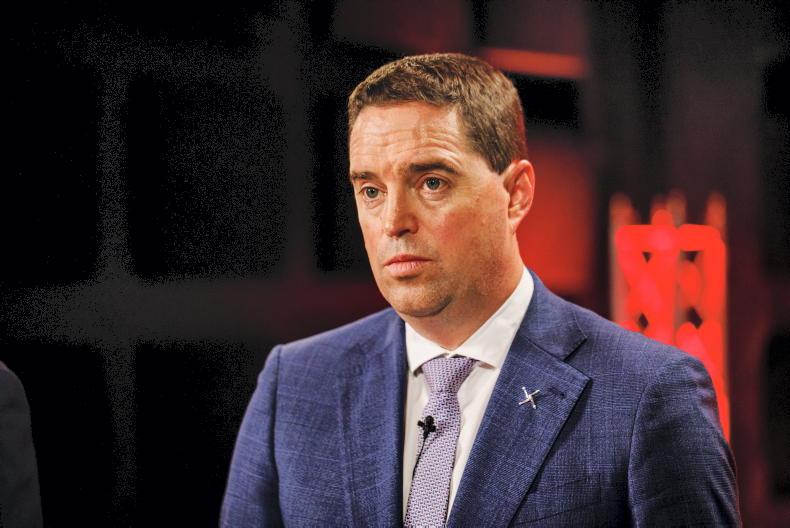
Martin Heydon, the new Minister for Agriculture, at the Irish Farmers Journal's election debate last November. \ Philip Doyle
Much like Hansen, Heydon will be judged by farmers on delivery. As I pointed out last week, he now occupies one of the hottest seats in all of Irish agriculture, with his every move subjected to intense scrutiny by the farm organisations, the agri media and a wide range of environmental organisations.
And I sometimes feel that farmers judge their Minister more harshly if they are perceived as very close to farming.
Charlie McConalogue must feel a little hard done by, being the only outgoing minister who was not reappointed to a cabinet position.
Michéal Martin had three promotions in his hand, due to two extra Fianna Fáil cabinet seats and the appointment of Michael McGrath as Ireland’s new European Commissioner. He chose to make four promotions and make a single demotion.
It seems harsh, particularly when looking at the new Government's regional disparity. There isn’t a single senior minister in the border constituencies from Louth to Cavan/Monaghan across the Sligo/Leitrim and into Donegal.
Indeed, the only Minister across all of Connacht and Ulster is Dara Calleary, so unlucky himself to lose his job over Golfgate in 2020, now back in cabinet.
I personally don’t buy the “four attending cabinet from Connacht” narrative.
Yes, it’s true that Séan Canney, Noel Grealish and Hildegarde Naughten will all be sitting at cabinet as super-junior Ministers of State (as indeed will Mary Butler). But they don’t have departments under them and they didn’t receive ministerial seals of office from President Higgins last Thursday.
The reality is that the maths for Connacht is one plus three, while the overall equation is five Dublin cabinet ministers, six more from the rest of Leinster, three from Munster (plus Butler as a super-junior) and Dara Calleary as the lone representative west of the Shannon, the political equivalent of Mack Hansen and Bundee Aki combined.

Former Minister for Agriculture Charlie McConalogue and Fianna Fáil's Dara Calleary at the National Ploughing Championships 2023 in Ratheniska, Co Laois. \ Philip Doyle
If Charlie McConalogue is giving advice to Martin Heydon, high among the tips might be not to expect any praise from farmers for anything he does for them.
Despite increasing payments for sheep from €10 to €25, sucklers from €80 to €230 and annual support for the tillage sector from €7m a year to €60m in 2023 and 2024, admittedly both one-off payments during two pretty disastrous years for the sector, he got little thanks and never saw his ratings among farmers rise much above the mediocre, even in the super year for farming that was 2022.
Farmers would deny that they bite the hand that feeds them and indeed would rightly see it as a patronising depiction of food producers.
However, there is a danger that constant criticism of the Minister of Agriculture of the day, which may have been a factor in Micheál Martin’s thinking, will see the agriculture minister’s job looked at as a poisoned chalice in future.
And that would be bad for farming. The hard-earned rights of representation for farmers mean fair play on both sides.
It’s been a busy week.
It started last Saturday evening, when I attended Wexford Irish Farmers' Association’s (IFA) 70th anniversary dinner.
That was an evening for looking back in appreciation of the representations made by the generations that went before us. Recognition for farmers as stakeholders in society is taken for granted nowadays, but those rights were hard won by farmers being prepared to go to jail rather than be ignored by Government in 1966.
The week quickly moved on to looking forward, with the IFA annual general meeting (AGM) welcoming the new European Commissioner for Agriculture and Food Christophe Hansen.
The only reason the minister for agriculture wasn’t there was because the event coincided with the two-day saga in Leinster House across Wednesday and Thursday.
Micheál Martin was eventually elected Taoiseach, as expected, and appointed Martin Heydon as Minister for Agriculture, as predicted, but not before Christophe Hansen had departed these shores.
And not before the combined opposition had given the new Government a bloody nose over where the Regional Independent Group TDs, who are not gaining minister of state positions, would sit.
Logic
For what it’s worth, I think the opposition was on the right side of this one. It makes little sense logically, regardless of procedural precedence, for people who have agreed a Programme for Government and signed up to it to sit on the opposition benches.
As the old cowboy saying goes: “You can’t ride two horses with one ass.”
It's become usual for both the Taoiseach and the Minister for Agriculture to attend the IFA’s AGM and various Government representatives attend other farm organisation AGMs.
In the last year alone, Charlie McConalogue was at the IFA, ICSA, INHFA and Macra events. Simon Harris attended the Macra AGM in October as Taoiseach, while his predecessor Leo Varadkar was at the 2024 IFA AGM this time last year.
The 2024 ICMSA AGM took place only three days after the general election and was devoid of politicians, who were focused on count centres around the country.
However, secretary general of the Department of Agriculture Brendan Gleeson was present.
The 2023 meeting had seen then-Taoiseach Leo Varadkar, environment minister and Green Party leader Eamon Ryan and the ubiquitous McConalogue all attend and partake.
Serious
It shows the seriousness which Irish politicians in general - and the Irish Government in particular - attach to Ireland’s farmer representatives. And we have to thank the men and women of 1966 for that.
I was reminded on the night that over 100 people were jailed during the Farmers’ Rights campaign of 1966-1967, as a campaign of civil disobedience saw roads blocked and rates unpaid.
Neighbours stepped in to help maintain the farm’s daily work routine, but a lot of the burden fell on wives and children.
Anyway, Christophe Hansen certainly supplied the X-factor at the IFA’s 70th AGM.
In a 20-minute address and a further hour fielding questions, he came across as someone from a farm, who can speak like a farmer and who understands what people mean when they speak to him as farmers. You can read my impressions here.
The IFA leadership seemed genuinely impressed with Hansen’s tone and language. It’s been a while since there was someone who seemed empathetic to their day-to-day existence in the agriculture commissioner’s seat, with the obvious exception of Tullaroan’s finest Phil Hogan.
You might have to go all the way back to Franz Fischler, at the turn of the century, to find someone who wasn’t primarily a technocrat.
Of course, tea and empathy won’t pay the bills and we will have to wait and see whether Hansen can deliver on CAP, on demanding that European farmers see more than lip service applied to equivalence of standards, on a fund for nature restoration and on delivering food chain equity for farmers in a country that exports 90% of what it produces.
Producer organisations will help, but will have no impact for Irish farmers on German, French and Italian retailers.
Heydon 'one of our own'
It will be interesting to see the reception that Martin Heydon will get from the farming organisations as the new Minister for Agriculture. I met with him on Saturday to discuss the many urgent issues waiting in his inbox. You’ll have to wait until next week’s paper to read that.
It’s fair to say that Heydon bears the welly marks even more visibly than Christophe Hansen. He didn’t just grow up on a Kildare farm, he worked it with his mother from the age of eight when his father passed away at a young age.
Heydon came back from Kildalton Agricultural college, still in his teens, to take over the day-to-day running of the suckler and tillage farm.

Martin Heydon, the new Minister for Agriculture, at the Irish Farmers Journal's election debate last November. \ Philip Doyle
Much like Hansen, Heydon will be judged by farmers on delivery. As I pointed out last week, he now occupies one of the hottest seats in all of Irish agriculture, with his every move subjected to intense scrutiny by the farm organisations, the agri media and a wide range of environmental organisations.
And I sometimes feel that farmers judge their Minister more harshly if they are perceived as very close to farming.
Charlie McConalogue must feel a little hard done by, being the only outgoing minister who was not reappointed to a cabinet position.
Michéal Martin had three promotions in his hand, due to two extra Fianna Fáil cabinet seats and the appointment of Michael McGrath as Ireland’s new European Commissioner. He chose to make four promotions and make a single demotion.
It seems harsh, particularly when looking at the new Government's regional disparity. There isn’t a single senior minister in the border constituencies from Louth to Cavan/Monaghan across the Sligo/Leitrim and into Donegal.
Indeed, the only Minister across all of Connacht and Ulster is Dara Calleary, so unlucky himself to lose his job over Golfgate in 2020, now back in cabinet.
I personally don’t buy the “four attending cabinet from Connacht” narrative.
Yes, it’s true that Séan Canney, Noel Grealish and Hildegarde Naughten will all be sitting at cabinet as super-junior Ministers of State (as indeed will Mary Butler). But they don’t have departments under them and they didn’t receive ministerial seals of office from President Higgins last Thursday.
The reality is that the maths for Connacht is one plus three, while the overall equation is five Dublin cabinet ministers, six more from the rest of Leinster, three from Munster (plus Butler as a super-junior) and Dara Calleary as the lone representative west of the Shannon, the political equivalent of Mack Hansen and Bundee Aki combined.

Former Minister for Agriculture Charlie McConalogue and Fianna Fáil's Dara Calleary at the National Ploughing Championships 2023 in Ratheniska, Co Laois. \ Philip Doyle
If Charlie McConalogue is giving advice to Martin Heydon, high among the tips might be not to expect any praise from farmers for anything he does for them.
Despite increasing payments for sheep from €10 to €25, sucklers from €80 to €230 and annual support for the tillage sector from €7m a year to €60m in 2023 and 2024, admittedly both one-off payments during two pretty disastrous years for the sector, he got little thanks and never saw his ratings among farmers rise much above the mediocre, even in the super year for farming that was 2022.
Farmers would deny that they bite the hand that feeds them and indeed would rightly see it as a patronising depiction of food producers.
However, there is a danger that constant criticism of the Minister of Agriculture of the day, which may have been a factor in Micheál Martin’s thinking, will see the agriculture minister’s job looked at as a poisoned chalice in future.
And that would be bad for farming. The hard-earned rights of representation for farmers mean fair play on both sides.







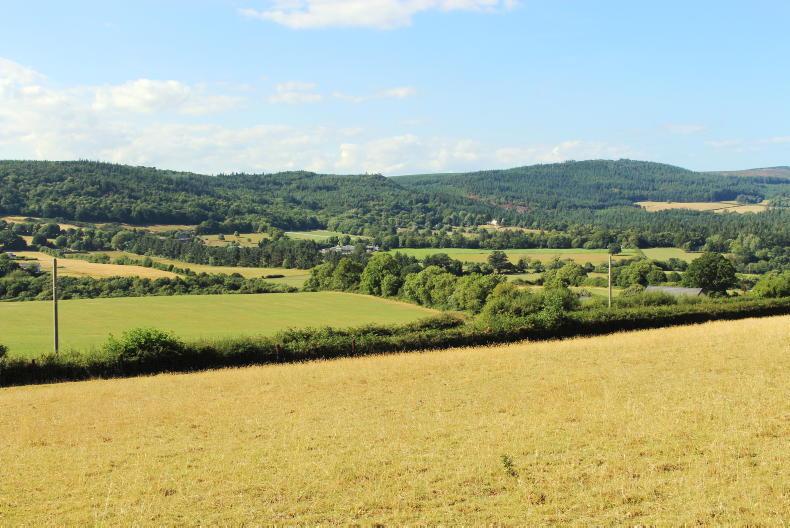

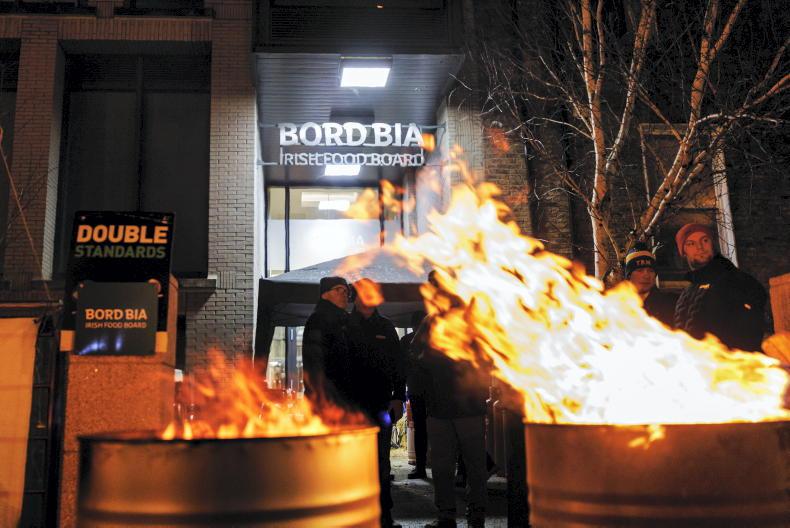
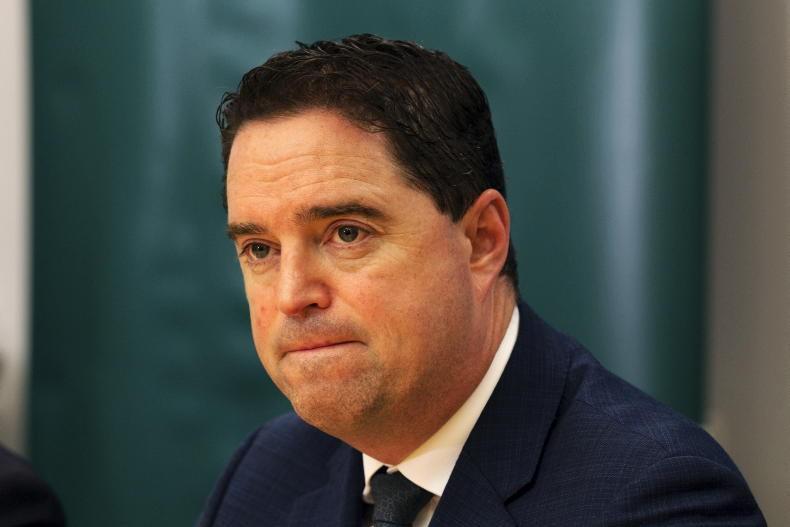
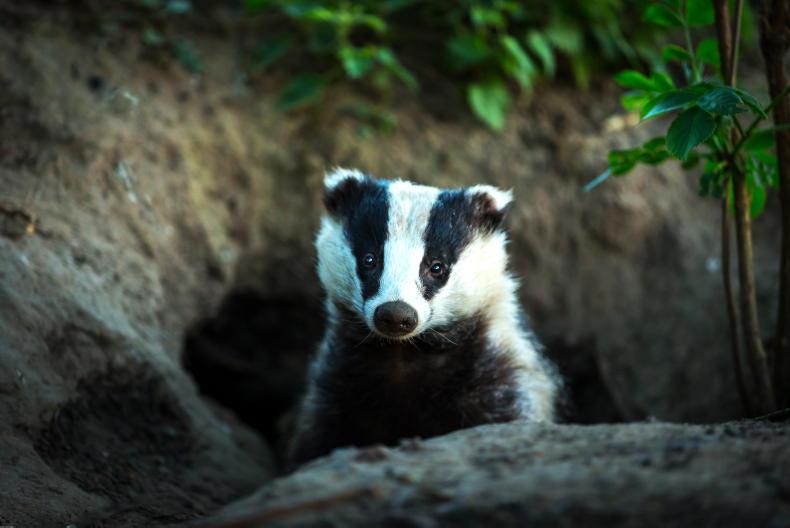
SHARING OPTIONS